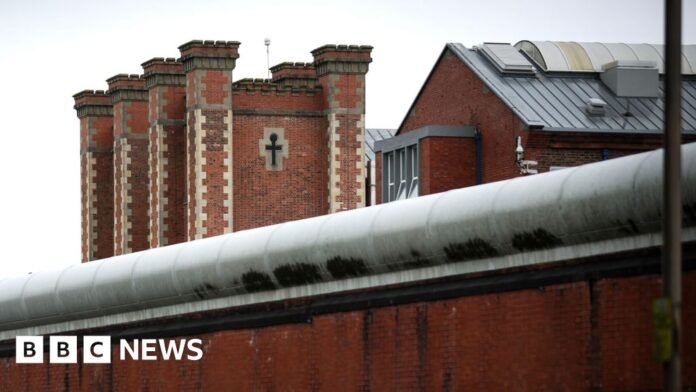Senior police and security leaders have raised concerns about the government’s proposals to release some prisoners early.
In a letter to the Ministry of Justice, first reported by the Times, that was sent before the announcement on sentencing changes last week, they said that based on their understanding the plans “could be of net detriment to public safety”.
The government argued many of their concerns had been addressed.
A source close to one of the signatories told the BBC it was sent not to oppose the government’s sentencing reforms or raise dissent. They insisted the letter was aimed at offering advice to support and shape the policy.
The signatories included Sir Mark Rowley, the head of the Metropolitan Police; the deputy director-general of MI5; Graeme Biggar, the director-general of the National Crime Agency; Gavin Stephens, the chairman of the National Police Chiefs’ Council (NPCC); Vicki Evans, the national lead on counter-terror policing and Sacha Hatchett, the national lead on criminal justice at the NPCC.
However the letter raises several concerns, including about the costs of electronic tagging and about repeat offenders avoiding jail if there is a move away from short sentences.
“Even where that does not change their long-term behaviour, it provides the community with a sense of justice and temporary respite, stopping their offending during their prison term – a point often ignored in the current narrative on recidivism rates and short sentences,” they said.
The letter argued against early releases for “high-risk offenders”, terrorists, and those jailed under national security legislation.
“It is vital we retain sentencing that provides a strong deterrent to those who may be tempted to work on their behalf, and robust arrangements for managing these high-demand risk cohorts in prison and post-release,” they said.
They wrote: “On the basis of what we understand at the moment, we are concerned that the proposals could be of net detriment to public safety and certainty to public confidence in policing and the criminal justice system.
“We are not arguing for the status quo. But we have to ensure that out of court does not mean out of justice, and out of prison does not mean out of control.”
The government argued the proposals once announced had addressed many of their concerns. Repeat offenders can still face short sentences under the changes. Terrorists will not be eligible for earlier release. And the probation service will be given up to £700m more by the end of the decade.
A Ministry of Justice spokesperson said: “This government inherited prisons in crisis, close to collapse. We will never put the public at risk by running out of prison places again.
“We are building new prisons, on track for 14,000 places by 2031 – the largest expansion since the Victorians. Our sentencing reforms will force prisoners to earn their way to release or face longer in jail for bad behaviour, while ensuring the most dangerous offenders can be kept off our streets.
“We will also increase probation funding by up to £700m by 2028/29 to tag and monitor tens of thousands more offenders in the community.”





